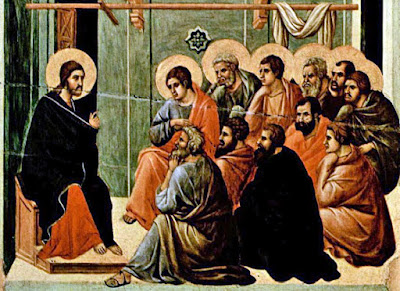For a Pharisee, of higher rank than usual, invited Jesus to a banquet: and He, although He knew their malice, went with him, and dined in their company. And He submitted to this act of condescension, not to honor His inviter, but rather to benefit those in whose company He was, by such words and miraculous deeds as might lead them to the acknowledgment of the true service, even that which is taught us by the gospel. For He knew that even against their will He would make them eyewitnesses both of His power, and of His more than human glory, if perchance even so they might believe that He is God and the Son of God, Who assumed indeed our likeness, but continued unchanged, nor ceased to be that which He had been.…
What benefit then He has here too discovered for us, we learn from the passage now read. For He was dining on the sabbath day with one of the Pharisees, at his special request. And his purpose in so doing, and motive we explained unto you when last we met together. But inasmuch as He saw certain of those who were invited foolishly seizing the uppermost seats as a thing of importance, and worth the taking, and that they were eager after vainglory, for the benefit both of them and us He utters an urgent warning, saying; “When you are bidden of any one, seat not yourself at the head of the seat, lest a more honorable man than you be bidden of him, and when he that bade you and him comes, he say unto you, Give this man place; and then you begin with shame to take the lowest place.”
Now such things may seem perchance to some to be but trifling matters, and not worthy of much attention. But when any one fixes upon them the eye of his mind, he will then learn, from what blame they deliver a man, and how great orderliness they produce in him. For in the first place to hurry inconsiderately after honors neither suitable, nor due to us, shews us to be foolish, rude, and arrogant, seizing what is not fitting for us, but for others rather, who are greater than and superior to ourselves. Whoever he be that thus acts, is hated, and often too becomes an object of ridicule, when he has to restore to others, and that often against his will, the honor which in no respect belongs unto him. “For when, He says, a more honorable man than thou comes, he that bade thee and him will say, Give this man place.” O! what great ignominy is there in having so to do! It is like a theft, so to speak, and the restitution of the stolen goods. He must restore what he has seized; for he had no right to take it. But the modest and praiseworthy man, who might without fear of blame have claimed the dignity of sitting among the foremost, seeks it not, but yields to others what might be called his own, that he may not even seem to be overcome by vainglory; and such an one shall receive honor as his due: for he shall hear, He says, him who bade him say, “Come up here.”
Cyril of Alexandria, Commentary on Luke Homily 101, 102


















